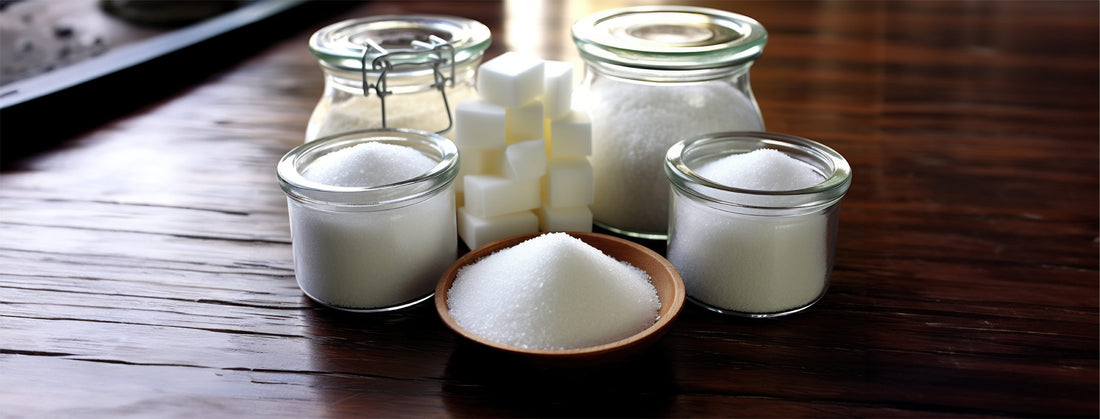
Are Artificial Sweeteners Bad For You?
Share
Artificial sweeteners have become a common alternative to sugar in our daily diets. From low-calorie drinks to "sugar-free" snacks, these sweeteners promise the pleasure of sweetness without the calories. But are artificial sweeteners bad for you? Let's explore the facts, the potential risks, and healthier alternatives.
Recent research has raised concerns about artificial sweeteners' effects on health, including their impact on insulin response, gut health, and weight management. Understanding these effects can help you make informed choices about what you consume.
What Are Artificial Sweeteners?
Artificial sweeteners are synthetic sugar substitutes used to sweeten food and beverages without adding calories. They are many times sweeter than sugar, meaning only a small amount is needed to achieve the same level of sweetness. Common examples include:
-
Aspartame
-
Saccharin
-
Sucralose
-
Acesulfame K
-
Neotame
These sweeteners are often found in diet sodas, sugar-free desserts, and even some processed foods labelled "low calorie."
Which Is Worse: Sugar or Artificial Sweeteners?
The debate over sugar versus artificial sweeteners is ongoing. While sugar consumption is linked to obesity, diabetes, and tooth decay, artificial sweeteners come with their own set of concerns.
Sugar provides calories and energy but can cause blood sugar spikes and contribute to long-term health issues when consumed in excess. On the other hand, artificial sweeteners don't contribute calories but may have unintended side effects, such as disrupting gut bacteria or increasing cravings for sweets.
Ultimately, neither is ideal in large quantities. Opting for natural alternatives, like honey or maple syrup in moderation, or reducing your overall sweetener consumption is often the healthiest choice.
List of Artificial Sweeteners to Avoid
Some artificial sweeteners are more controversial than others due to potential health risks. Here are some to watch out for:
-
Aspartame – Linked to headaches and potential neurological effects in some people.
-
Saccharin – Early studies raised cancer concerns, though later research suggests it may be safe in moderate amounts.
-
Sucralose – May alter gut bacteria and affect insulin sensitivity.
-
Acesulfame K – Associated with potential metabolic and gut health issues.
-
Cyclamate – Banned in some countries due to possible cancer risks.
Always check ingredient labels for these names and consider alternatives when possible.
Artificial Sweeteners Side Effects
Artificial sweeteners may have several potential side effects, including:
-
Gut Health Issues: Research suggests artificial sweeteners may disrupt gut bacteria, which play a crucial role in overall health.
-
Insulin Response: Some studies indicate they may cause a small insulin spike, though the effects can vary.
-
Increased Cravings: Artificial sweeteners can sometimes lead to a heightened desire for sweet foods, potentially contributing to overeating.
-
Weight Management Challenges: Contrary to their intended purpose, artificial sweeteners might hinder weight loss by altering metabolism or encouraging calorie compensation.
Drinks Without Artificial Sweeteners
If you're looking to avoid artificial sweeteners, there are plenty of healthier drink options available:
-
Water with Fresh Fruit Infusions: Add slices of lemon, cucumber, or berries to your water for a refreshing, natural flavour.
-
Herbal Teas: Naturally sweet and calorie-free.
-
Cold-Pressed Juices: Britts Superfoods offers delicious, nutrient-packed juices that are free from artificial sweeteners.
-
Kombucha: A naturally fizzy, gut-friendly drink.
Choosing drinks without artificial sweeteners can help you reduce potential health risks while staying hydrated and refreshed.
FAQs
Do Artificial Sweeteners Spike Insulin?
Some studies suggest artificial sweeteners might trigger a slight insulin response, particularly in sensitive individuals. This response varies by sweetener and individual, so monitoring your body's reaction is essential.
Do Artificial Sweeteners Cause Weight Gain?
While artificial sweeteners are calorie-free, they may lead to weight gain indirectly by increasing cravings for sweet foods or altering how your body processes calories. Balanced, whole-food-based diets are typically the best approach to weight management.
So, are artificial sweeteners bad for you? While they can be a useful tool for reducing calorie intake, their potential side effects shouldn't be overlooked. To make the best choices for your health, consider natural alternatives, moderate your sweetener use, and choose products free from artificial ingredients.
Ready to embrace healthier habits? Explore Britts Superfoods' range of natural, nutrient-rich juices to nourish your body and mind—without artificial sweeteners! Helping your body detox from artificial sweeteners is a great first step. Our 100% organic superfood juices are packed with nutrients to support your body’s natural detoxification processes. By choosing our juices, you’re giving your body a fresh start with high-quality, natural ingredients that help you feel energised, revitalised, and healthier.

